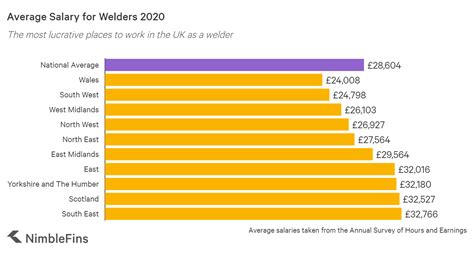Welding Careers: Salary Avg. & Lucrative Positions

Are you considering a career in welding? Welding is a skilled trade that offers a wide range of opportunities and can lead to a rewarding and lucrative career. In this article, we will explore the average salary for welders and highlight some of the most lucrative positions within the field. Whether you are just starting out or looking to advance your career, this guide will provide valuable insights into the world of welding.
1. Average Salary for Welders
Before diving into the different welding positions, let’s first take a look at the average salary for welders. According to the Bureau of Labor Statistics, the median annual wage for welders, cutters, solderers, and brazers was $42,490 as of May 2020. However, it’s important to note that this average can vary depending on factors such as experience, location, industry, and level of certification.
1.1 Factors Affecting Salary
Several factors can influence the salary of a welder. These include:
- Experience: Welders with more experience tend to earn higher salaries.
- Location: Wages can vary significantly depending on the geographic location. For example, welders in big cities or areas with a high cost of living may earn more.
- Industry: Different industries may offer higher wages for welders. For instance, the oil and gas industry often pays welders higher salaries.
- Certifications: Welders with additional certifications and specialized skills may command higher wages.
2. Lucrative Positions in Welding
Now that we have discussed the average salary for welders, let’s explore some of the most lucrative positions within the welding industry.
2.1 Underwater Welding
Underwater welding is one of the highest-paying positions in the welding field. This specialized skill involves welding in an underwater environment, typically in offshore oil rigs or other marine structures. Due to the hazardous nature of the job and the required training, underwater welders can earn significantly higher salaries compared to other welding positions.
Example:
One of the leading institutions that offers training for underwater welding is the Diver’s Institute of Technology located in Seattle, Washington. Graduates from this program have gone on to work in various industries, including offshore oil and gas, ship repair, and underwater construction.
2.2 Pipeline Welding
Another lucrative position within the welding industry is pipeline welding. Pipeline welders are responsible for joining pipes to create a network of pipelines for transporting oil, gas, and other fluids. This type of welding requires specialized skills and often involves working in remote locations. Pipeline welders can earn higher salaries due to the demanding nature of the job and the need for travel.
Example:
One of the well-known companies in the pipeline welding industry is Welded Construction, L.P. This company specializes in pipeline construction and maintenance and has a strong reputation for providing high-quality welding services.
2.3 Aerospace Welding
Aerospace welding is another lucrative field within the welding industry. Aerospace welders work on aircraft and spacecraft, ensuring the integrity and safety of critical components. This type of welding requires precision and attention to detail, as well as knowledge of specific materials and industry standards. Aerospace welders can earn higher salaries due to the specialized nature of the work and the stringent quality requirements.
Example:
Pratt & Whitney, a renowned aerospace manufacturer, often hires skilled welders to work on their aircraft engines. The company is known for its commitment to quality and innovation, making it an attractive employer for aerospace welders.
2.4 Structural Steel Welding
Structural steel welding involves joining beams, columns, and other components to create frameworks for buildings, bridges, and other structures. This type of welding requires a strong understanding of structural engineering principles and the ability to work with large and heavy materials. Structural steel welders can earn higher salaries due to the complexity of the work and the need for precision.
Example:
One of the leading structural steel fabrication companies in the United States is Cives Corporation. They specialize in the fabrication and installation of steel structures for various industries, including commercial, industrial, and infrastructure.
3. Conclusion
Welding offers a wide range of opportunities for those looking for a rewarding and well-paying career. The average salary for welders is influenced by factors such as experience, location, industry, and certifications. However, certain positions within the welding industry, such as underwater welding, pipeline welding, aerospace welding, and structural steel welding, can offer significantly higher salaries due to their specialized nature and demand. If you are considering a career in welding, exploring these lucrative positions can help you make informed decisions about your professional path.
4. FAQs
4.1 What is the average salary for a welder?
The average salary for a welder is $42,490 per year, according to the Bureau of Labor Statistics. However, this can vary depending on factors such as experience, location, industry, and certifications.
4.2 How much do underwater welders make?
Underwater welders can earn significantly higher salaries compared to other welding positions. The exact salary can vary depending on factors such as experience, location, and the specific job requirements, but it is not uncommon for underwater welders to earn six-figure incomes.
4.3 What certifications are needed for pipeline welding?
Pipeline welders often need to obtain certifications such as the Certified Welding Inspector (CWI) certification from the American Welding Society (AWS) and the Pipeline Welding Certification from the American Petroleum Institute (API).
4.4 What skills are required for aerospace welding?
Aerospace welders need to have a strong understanding of welding techniques, materials, and industry standards. They also need to possess excellent attention to detail, precision, and the ability to interpret engineering drawings and specifications.
4.5 How can I become a structural steel welder?
To become a structural steel welder, you typically need to complete a welding program or apprenticeship and obtain relevant certifications. Additionally, gaining experience in structural steel fabrication and construction can be beneficial for advancing your career in this field.

